#extent and them being hot in form disguised a lot of issues
Explore tagged Tumblr posts
Text

he can’t keep getting away with this
#son heungmin#tottenham#football#he’s just been consistently outperforming his xG since the beginning of his career#also why imo the interpretation and the reliance of xG when it comes to looking at individual players is flawed#it’s a useful metric for measuring a system; we should always be looking to increase the number of shots we get off#and most importantly create dangerous situations bc high xG = more goals usually#but the players themselves are individual. sonny specifically can score with 0.02xG and has been doing it for years#which is why having him in your team is irreplaceable; he’s clinical in a way no other current forward in the world is#so xG applied to him doesn’t rly matter imo. that being said he masks a lot of potential issues with a system’s attacking threat#bc of how good he is. that was kind of the issue w mourinho and first szn conte; sonny and harry have always been xG cheaters to a certain#extent and them being hot in form disguised a lot of issues#anyway sorry abt the ramble#rahul.txt
8 notes
·
View notes
Text
New Sonic IDW Analysis SPOILER WARNING
After reading the recent comic, I got some thoughts. Want to have a casual read?
These are just opinions, I’m not trying to shout aloud stuff, but if you’re interested in how someone else thinks--for pure curiosity and not to gain anything--then as a fan, I’ve got some words! :Db
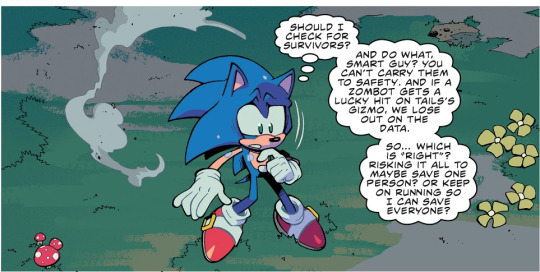
First off, they’re really targeting all the canonically proclaimed (but never really touched upon) flaws and weaknesses Sonic has been “stated” to have. At first, I thought these were well done! Great ideas can sometimes not come into fruition right, however, and I’m afraid I’m seeing a lot of “liberties” and “Opinions” taking place in the script. These could be outside forces, but there seems to be a growing ‘anxiety’ for the script to ‘keep targeting’ certain things/issues.
This isn’t necessarily a bad desire! It’s wonderful that IDW are looking so into character! However, this is one of the first times I’ve seen a blatant misconception and/or mislabeled writing. What I mean is, someone is trying very hard to get a point across, to where the original idea seems saturated by personal agendas. This is littered throughout the new issue, though I applaud those who knew that Sonic and his universes needed these things addressed, but the way they went about them seemed a little off-brand to me, so much so, that it messed with the recent ‘good flow’ the comic had going.
The Hero’s Delima is a complexed algorithm, so to speak, and trying to cram that into a short comic shows the anxiety of the writer. Which I sympathize with. Even as a fanfiction writer, being limited to a certain amount of pages?! How dare you limit the story and my art! -table flip- but I appreciate how accurate to the original Sonic’s ‘struggles’ it is, but it’s definitely not in the spirit of the Japanese Sonic, at least, its trailed off into something of its own.
For ex.

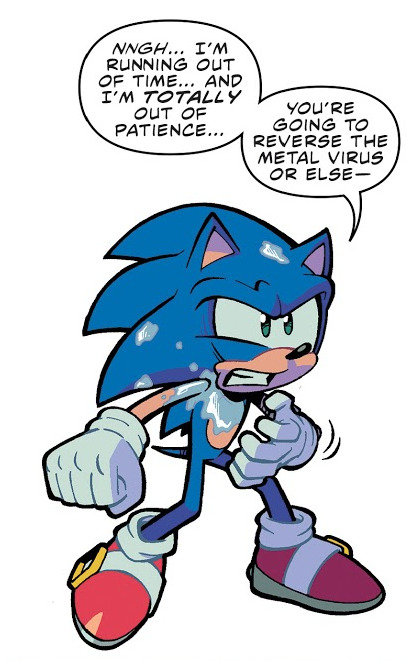
It’s true that Sonic is listed as “Being a hot-head” or “impulsive” but we really don’t see these too much in the canon. It’s the same with Eggman,

He’s known for not thinking things through in his whimsical but diabolical planning. It goes hand-in-hand with his “I’m gonna do this! What? It has consequences to the environment? Oh well! Who cares about nature anyway!? Hahaha!” character trait, but Eggman has never contemplated good. It’s interesting to note that Eggman likes to be praised when doing something, but that something is usually evil disguised as good. So I’m a little confused why they’re trying to ‘redeem’ Eggman because this script implies a ‘redemption’ arc for Eggman’s incidents regarding Sonic Forces... But... It doesn’t add up to what--at least--I know of his character and demeanor.
Sonic is also acting strange, leading me to believe that if not a redemption arc, a Hero’s Fall arc. Which... also doesn’t make sense? I’m confused by the writing.
Dr. Starline also makes me wonder. He’s such a fun character! But in this issue, he seems literally created to point out Eggman’s flaws which he won’t do himself... Yes, as the reader, we want to be aware of his character development, but this is... somewhat too on the nose and odd placing? If that makes sense?
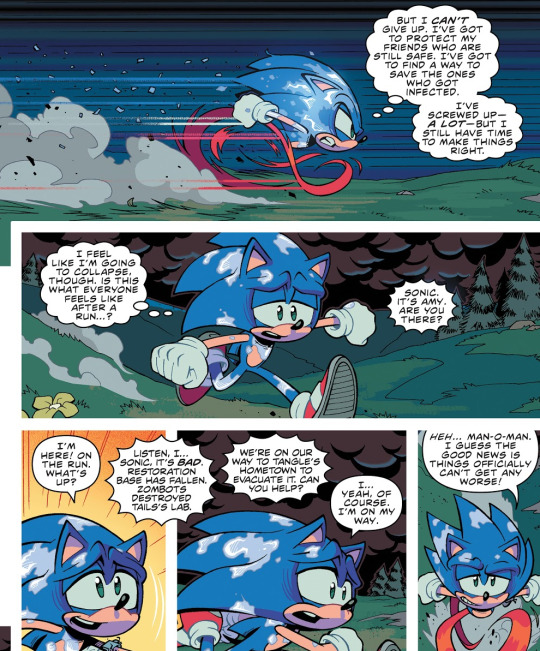
Sonic’s hints of loneliness, usefulness, heroic idealism, common good, etc. place a very interesting dynamic on him. He’s got a lack of sleep, which is a physical weakness recorded by the officials themselves (so I’m told) and as a fan of Sonic and Amy’s antics (lol) I loved the part where he reached out for her. The usual cheery, optimistic friend is now worry-stricken and full of responsibility. This is replacing Sally’s usual station, which I think Amy could easily substitute, but why? This isn’t Archie anymore, we don’t need these ‘war’ themes and ‘heroic odds’ like this. It’s just not coming off as good as it once was, because it’s become something more and also something less in many different areas. Either someone is pushing themselves too hard, or something is pushing the team at IDW too much... either way, it’s not looking good. Even the art department seems to be struggling with a quiet stress that isn’t being stated.
And if it is, oh boy, is no one listening to them. (A common theme really...)
Side note:
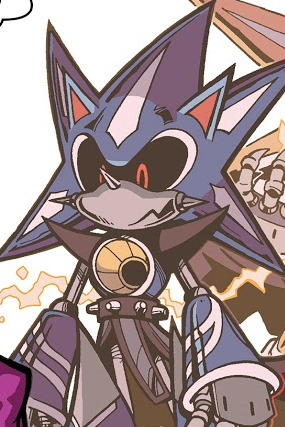
MY BOI.
He is described as downloading Eggman’s data first. FALSE. *At least, from what I know, anyway.* He was originally uploaded and ‘turned to life’ from Sonic’s data. Hence why he rebelled against Eggman, was likely rebuilt or another one created. He has an ego problem, but I wonder how they’re justifying this..? Yes, you did your homework, but how is that going to help revive and re-foundation the characters? They need solid ground, and some things are coming off ‘opinions’ and ‘filling in the blanks’ which is creative but you can do that with the facts given to you.
Honestly, it’s like someone handed these people slips of paper and said, “That’s it. That’s all they made-up. That’s all you get.” and the rest isn’t translated from Japanese or something like??? I’m just a fan, and I’ve found things out the old fashion way. I’m grateful they got so much right, but Eggman isn’t meant to be a good guy... He can do good things, but only when the situation also benefits himself. (Like in Sonic 06, Lost World, etc. Which... aren’t the best examples but that’s what I’ll put down to make this quick, haha.)

Don’t ever meet your heroes... or in this case, your villains. I’m excited to see how Starline pans out. I see an arc forming... a very tragic and sinister arc, but I can’t tell where it will lead just yet... I’m liking the foreboding but also scared of how I’ll take it...
Sonic’s portraying too many ‘traditional hero’ forms common in media, (Like Japan) but its disturbing to see most of his character cut out to replace them with these common themes. Sonic is not common! He’s the rebel hero! He’s unconventional but good! That’s what made him the ‘cool hedgehog’ back in the 90′s.
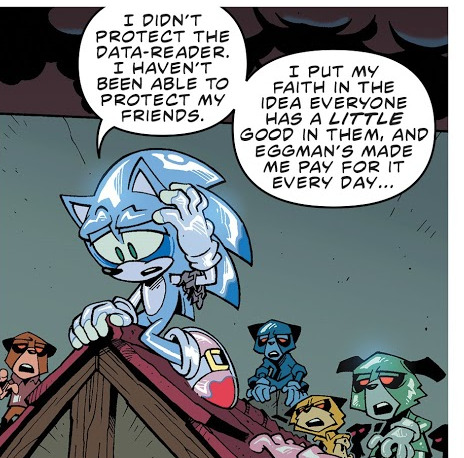
This whole turn for Sonic is weird to me. I will, of course, keep reading, but it’s very... very odd for the genre that Sonic embodies. At least, to me. This just doesn’t fit into “Sonic” or the formulas that should be in place for him.
At least, the formulas I’ve tried to find, anyway.
The deadly six were alright. I thought they were handled decently.
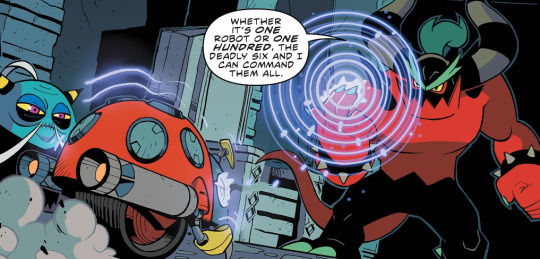
I also like how Starline is smart. A good contrast to Eggman’s makeshift ways, but I do think Eggman is a bit more ‘intelligent’ than what they’re playing at. Yes, he plays like a man-child, but not to this extent...
What makes me the expert? Please don’t say that,... I’m not trying to be the ‘voice of all-knowing’ness, but rather, a practical reasoning that might hint at what is to come.
There was a lot to dissect, but that’s what I’ll end with now. Thanks for reading and I hope you were intrigued at what I pointed out :)b
65 notes
·
View notes
Text
The Book Ramblings of June
In place of book reviews, I will be writing these ‘book ramblings’. A lot of the texts I’ve been reading (or plan to read) in recent times are well-known classics, meaning I can’t really write book reviews as I’m used to. I’m reading books that either have already been read by everyone else (and so any attempt to give novel or insightful criticisms would be a tad pointless), or are so convoluted and odd that they defy being analysed as I would do a simpler text. These ramblings are pretty unorganised and hardly anything revolutionary, but I felt the need to write something review-related this year. I’ll upload a rambling compiling all my read books on a monthly basis.
The Man Who Was Thursday - GK Chesterton I bought the Penguin English Library edition of this book mainly because of a tweet that I saw slagging off the cover, saying that the sticks of dynamite in the cover pattern looked like tampons and that 'this could have been avoided if only one woman had looked at the cover’; this irritated me a lot because I know for a fact that the cover was in fact designed by a woman (Coralie Bickford-Smith, to be precise, an artist whose similar works I am also a good fan of), and I wanted to own this edition simply so that I could prove to myself and others that this is the case. However, whilst the cover of this book is indeed very pretty, the texts published in the Penguin English Library collection do not possess the handy introductory chapter at the beginning that the Penguin Classics include, and thus with no frame of reference, I was at something of a loss to describe this book. It is certainly an interesting read insofar as it seemingly refuses to stay as one genre for the whole book. The blurb describes it as a ‘strange and haunting novel’, and at the beginning, this is very appropriate; it depicts a sensationalist image of villainous anarchists and zealous unhinged detectives that is incredibly compelling, and I hold that the character descriptions of the members of the Council of Days (as introduced in chapter five) make for some of the best writing that I’ve ever had the pleasure of reading. By fuck is Chesterton great at characterising these dudes. The blurb describes the novel as a spy thriller, and all seemed to be going well on this front, with a melodramatic but consistent tone maintained for around the first half of the book, with some great twists scattered here and there for good measure. But then things start getting a tad daft, and I’m going to spoil a bit of the plot here because you need to understand how off the rails this shit gets. The adventure grows to involve much of the main cast of antagonists being revealed to be policemen in increasingly convoluted disguises, ridiculously overblown chases in different countries with the stakes being continuously raised in the stupidest and funniest ways, and the main antagonist, built up as a grand unknowable titan of crime and anarchy, escapes the protagonist by leaping over a balcony ‘like an orang-utan’, riding away on a rampaging elephant that he broke out of the zoo, and finally evading capture by flying away on a stolen hot air balloon. Now don’t get me wrong, I’m a big fan of this sort of shit as a general rule, but by fuck does it seem incongruous in a novel such as this, that is so clever and so beautifully written and, whilst containing its few bits of sensational ridiculousness (as an overt parody of the genre or its tropes), generally quite a serious read. Similarly to The Heat’s On, if this book had just kept on the rails or channelled its madness into chaos that stayed within the genre’s boundaries, instead of just throwing its hands up into the air and screaming, ‘fuck it, put in an elephant chase scene!’, I’d have enjoyed it a lot more. As it is, it reminds me of the overblown nonsense of the 007 stories - this is a novel for dads, I reckon. After finishing this book I then found Beaumont’s introduction to the text, which describes the text as ‘antirealist’, and cites Chesterton’s description of ‘great works which mix up abstractions fit for an epic with fooleries not fit for a pantomime’. As a concept, I can fully get behind this - the juxtaposition of heroics and farcical nonsense puts me in mind of high burlesque, and I’ve always been fully against realism because fuck that noise. But you can’t stick with the idea of this book being wholly antirealist if it takes place in a world recognisable as our own and then suddenly changes to be ludicrous and laughable; that’s just inconsistent, and indeed mildly vexing when I was fully engrossed in the sensational spy thriller. Furthermore, attempting to justify this book’s content by saying that it is reminiscent of a ‘nightmare’ is a bullshit defence, because a) the word ‘nightmare’ could simply be used in reference to this book’s negative depiction of a world in which anarchists triumph in their nasty villainy, and b) it’s difficult to keep the idea of this book’s world supposedly being a dream forefront in one’s mind when it, as mentioned above, represents a view (albeit a sensational one) of reality, with dream nonsense hardly being a part of it at all. That is, of course, until the very end, when the book gives up all pretence of being a spy novel and instead wallows in metaphor and overt Christian imagery before ending abruptly. The ending is bullshit and I don't like it.
Dead Souls - Nikolai Gogol I’ve often cited Gogol as one of my favourite authors, but for the longest time I stayed clear of this book, somewhat daunted by whether what I loved about Gogol’s short stories would translate well to a novel form. This is a different beast to his short stories, but no less interesting to talk about, and indeed possessing many of the short story’s positive attributes, for all of the excellent writing, characterisation, and understanding of the fun nuances of society abounds here as it does in his shorter works. Apparently Gogol was attempting to recreate the structure and overall vibe of The Odyssey and other such Homeric epics in prose form, and although the overall setting and storyline does not reflect the grand awe-inspiring epics of the past, I’ll be buggered if the story’s writing and tone doesn’t somehow achieve it. This is not, despite what some critics have said, due to Gogol’s tendency to ramble on about unrelated digressions (a device apparently comparable to Homeric epics), or at least it didn’t stick out to me as such when I read it - that’s just kind of what Gogol does. No, it’s the writing and tone, as mentioned above, that seems to ape the Homeric tone, in such a way that you wouldn’t notice its explicit presence until after you’d been informed of it, and yet when you are aware of the Homeric influence you see it everywhere clear as day; I’d call it an ineffable concept but that’s just me trying to cover up for the fact that I can’t find the words, because I’m bad at writing these things. But I digress. Gogol’s excellent means of conveying character voices shines as always in this text, but I can’t feel like I’m missing the extent of it because I’m reading it in English. The introduction by Robert A Maguire describes Gogol’s extensive research into ‘all the prosaic rubbish of life, all the rags’, and makes efforts to incorporate such minor details as regional slang, official jargon, outdated terminology, etc. into his characters’ voices, but I fear that I’m missing some of the nuances of these techniques by my lack of knowledge in these fields or that some of the subtleties in language don’t translate as well as they ought to. Of course there are some characters which exemplify Gogol’s skill at diverse voices, such as some of the peasant muzhiks and one of my favourite characters Nozdryov (who draws from a wide array of sources for his dialogue with hilarious results), but there are some instances in which the character voices seem somewhat interchangeable, especially considering how a lot of individual personality is often subsumed by the necessity of upholding social decorum, and thus there are many characters who only speak in refined socially acceptable manners. The characters themselves are all bloody great, be they individual grotesque landowners or incredibly detailed and often brilliantly satirical descriptions of wider groups or demographics. Whilst the writing remains as excellent as ever, the characters in the second part of the book lack the grotesque simplicity of those in the first part - indeed, efforts are made by Gogol to give them complex fleshed-out characterisation - and subsequently these new characters are nowhere near as memorable as the fantastic personifications of negative traits that we got in the first part. Yeah, I forgot to mention, this book is technically made up of two parts, the first part highlighting the problems of society and the second part intended to delve into the resolution of some of these issues; of course, the second part does not exist in its entirety, because Gogol was a great fan of melodramatically burning his manuscripts, but it’s not a major issue because what does survive of the full text is amazing enough on its own (specifically the entirety of part one). Plus, I’ve delved into my thoughts of authors trying to ‘change the world’ through their works (in that I think that it’s a fool’s notion and only really serves to exemplify the author’s delusion), so I’m content with this text only portraying the detrimental aspects of society, as opposed to trying to fix them. I am quite fond of the narrator in this book. Similarly to his short stories, Gogol employs a narrative voice that exists almost as a character in of itself, and I don’t just mean that in the sense of ‘it’s got a lot of personality’. The narrative voice apologises for the story’s content and makes changes in an attempt to preserve decorum, it makes excuses for the story’s characters (especially the protagonist Chichikov), it often reveals information at the same rate as the characters within the setting discover things and have epiphanies, and it even establishes itself as a character with a physical voice as it only chooses to speak of Chichikov’s past when Chichikov himself is asleep, and apologises all the while lest he somehow slight the man. Bringing up this also gives me an opportunity to briefly mention the 2006 BBC radio adaptation for this, which establishes the narrator as a physical character in all scenes to humourous effect (and what’s more gave me yet more reason to love Mark Heap, who makes for a fucking excellent Chichikov). But I digress. Part two of the novel, as mentioned above, does not possess the same sort of wonderfully grotesque characters as part one, and considering that this is a novel defined mainly by its characters, this is somewhat problematic. The plot of part two is perhaps vaguely interesting, even though it seems to shunt the titular focus of dead souls to the side somewhat, but all in all I found it difficult to be too invested in this new story due to its lack of compelling characters. In addition, the Homeric epic tone of part one is somewhat absent, and without a distinctive narrative voice, the narrative suffers. I feel bad shitting on part two, since it was everyone else shitting on part two that catalysed Gogol to burn the manuscript (again) and possibly starve himself to death. Honestly, the first part is bloody amazing, so just read that and then be satisfied with the knowledge that your opinion of the book overall has not been tarnished by the shoddy second part. Sorry Gogol.
Complete Short Fiction - Oscar Wilde I’ve been vaguely aware of Wilde’s short fiction for a while now, having read a selection of his fairy tales and ‘Lord Arthur Savile’s Crime’ (a favourite of mine) for uni, so I decided to give his complete collection a shot. The Penguin Classics edition of his short fiction is separated into his different published collections, but can generally be categorised as either fairy tales or miscellaneous short stories. I’ve studied a shit load of fairy tale authors/compilers (Basile, Straparola, Perrault, the Brothers Grimm, Andersen, Wilde and whoever compiles the radical Russian fairy tales), and Wilde is certainly my favourite of the bunch. The specific blend of Wilde-esque traits incorporated into the fairy tale format make up my favourite fairy tales of any author - this is by no means all of Wilde’s fairy tales, but I’ll get into that. My favourite fairy tales of Wilde take place in a world vaguely recognisable as our own, or at least existing as an exaggerated facsimile of our own society, not just because the urban setting reminds me of Hoffmann’s ‘The Golden Pot’, but because such a setting allows for some heavy-handed but undeniably hilarious social commentary and satire. Such satire works especially well when juxtaposing the romanticised world of the fairy tale with the grimmer reality of Wilde’s society - the two tales that commence the collection, ‘The Happy Prince’ and ’The Nightingale and the Rose’, exemplify this excellently. Whilst I liked the satire attainable by setting the fairy tale in an urban society environment, similar levels of hilarity are obtained via Wilde’s satirical look at certain character archetypes (the titular character in ‘The Remarkable Rocket’ being my favourite example). The fairy tales obviously possess their morals and their teachings (though I was a fan of how this is subverted slightly by some characters actively avoiding, misinterpreting or arguing with the story’s moral), but the tropes that we’d expect to see in fairy tales - the morals from Perrault, the recurring overt ties to Christianity from Andersen, etc. - are not why I like Wilde’s fairy tales so much. The tales in the collection titled A House of Pomegranates are undeniably excellently written, and what’s more include some fantastic settings inspired by the Victorian obsession with the Orient that allow for phenomenal and evocative descriptive writing (the likes of which is not seen in any other of Wilde’s fairy tales), but they fail to capture my preferred positive attributes that the aforementioned tales possess. I cheekily skipped 'The Portrait of Mr W H' because I’d heard from a mate who had also read it that it was a long and dull read, and thus refrained from checking it out lest it tarnish my idealised view of Wilde. I’m sure I’ll live with myself knowing that I haven’t read Wilde’s entire body of works. Indeed, who gives half a toss about that when we’ve still got to talk about the last remaining collection contained within this publication: ‘Lord Arthur Savile’s Crime and Other Stories’, which is not made up of fairy tales but other ‘popular’ genres of writing. Taken at face value, the stories’ content of murder, ghosts, and mystery slot in nicely alongside the fairy tales, in that they can all be considered, at face value, writings intended to appeal to the low-brow interests of the masses. They are, of course, more than that, possessing some great subversions of genre tropes and Wilde’s typical social satire, which all comes together to make the short stories (in particular ‘Lord Arthur Savile’s Crime’ and ‘The Canterville Ghost’) hilarious and very enjoyable reads. The fact that these stories are written with the primary intentions of entertaining, rather than revolutionising the written form or making one think about grand philosophical themes, means that I can’t really offer anything about the stories other than that they’re fucking good and that you should go and read them.
Shit I read this month that I couldn’t be arsed to write about: A Short History of Drunkenness by Mark Forsyth (which I started back in December(?) last year, forgot about until now, and love immensely), and ‘The Penal Colony’ by Kafka (it was much more enjoyable than the other works by Kafka that I’ve read, but that isn’t really saying much).
#book reviews#book ramblings#the man who was thursday#gk chesterton#dead souls#nikolai gogol#oscar wilde#lord arthur savile's crime#the canterville ghost#the happy prince#the remarkable rocket#the nightingale and the rose
1 note
·
View note